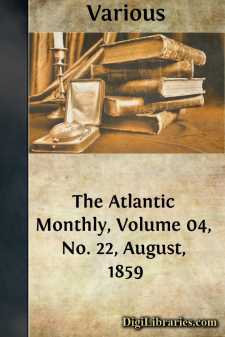Categories
- Antiques & Collectibles 13
- Architecture 36
- Art 48
- Bibles 22
- Biography & Autobiography 813
- Body, Mind & Spirit 142
- Business & Economics 28
- Children's Books 15
- Children's Fiction 12
- Computers 4
- Cooking 94
- Crafts & Hobbies 4
- Drama 346
- Education 46
- Family & Relationships 57
- Fiction 11828
- Games 19
- Gardening 17
- Health & Fitness 34
- History 1377
- House & Home 1
- Humor 147
- Juvenile Fiction 1873
- Juvenile Nonfiction 202
- Language Arts & Disciplines 88
- Law 16
- Literary Collections 686
- Literary Criticism 179
- Mathematics 13
- Medical 41
- Music 40
- Nature 179
- Non-Classifiable 1768
- Performing Arts 7
- Periodicals 1453
- Philosophy 64
- Photography 2
- Poetry 896
- Political Science 203
- Psychology 42
- Reference 154
- Religion 513
- Science 126
- Self-Help 84
- Social Science 81
- Sports & Recreation 34
- Study Aids 3
- Technology & Engineering 59
- Transportation 23
- Travel 463
- True Crime 29
The Atlantic Monthly, Volume 04, No. 22, August, 1859
by: Various
Categories:
Description:
Excerpt
THE DRAMATIC ELEMENT IN THE BIBLE.
We say dramatic element in the Bible, not dramatic element of the Bible, since that of which we speak is not essential, but incidental; it is an aspect of the form of the book, not an attribute of its inspiration.
By the use of the term dramatic in this connection, let us, in the outset, be understood to have no reference whatever to the theatre and stage-effect, or to the sundry devices whereby the playhouse is made at once popular and intolerable. Nor shall we anticipate any charge of irreverence; since we claim the opportunity and indulge only the license of the painter, who, in the treatment of Scriptural themes, seeks both to embellish the sacred page and to honor his art,—and of the sculptor, and the poet, likewise, each of whom, ranging divine ground, remarks upon the objects there presented according to the law of his profession. As the picturesque, the statuesque, the poetical in the Bible are legitimate studies, so also the dramatic.
But in the premises, is not the term dramatic interdicted,—since it is that which is not the Bible, but which is foreign to the Bible, and even directly contradistinguished therefrom? The drama is representation,—the Bible is fact; the drama is imitation,—the Bible narrative; the one is an embodiment,—the other a substance; the one transcribes the actual by the personal,—the other is a return to the simplest originality; the one exalts its subjects by poetic freedom,—the other adheres to prosaic plainness.
Yet are there not points in which they meet, or in which, for the purposes of this essay, they may be considered as coming together,—that is, admitting of an artistical juxtaposition?
In the first place, to take Shakspeare for a type of the drama, what, we ask, is the distinguishing merit of this great writer? It is his fidelity to Nature. Is not the Bible also equally true to Nature? "It is the praise of Shakspeare," says Dr. Johnson, "that his plays are the mirror of life." Was there ever a more consummate mirror of life than the Bible affords? "Shakspeare copied the manners of the world then passing before him, and has more allusions than other poets to the traditions and superstitions of the vulgar." The Bible, perhaps, excels all other books in this sort of description. "Shakspeare was an exact surveyor of the inanimate world." The Bible is full of similar sketches. An excellence of Shakspeare is the individuality of his characters. "They are real beings of flesh and blood," the critics tell us; "they speak like men, not like authors." How truly this applies to the persons mentioned in sacred writ! Goethe has compared the characters of Shakspeare to "watches with crystalline cases and plates, which, while they point out with perfect accuracy the course of the hours and minutes, at the same time disclose the whole combination of springs and wheels whereby they are moved." A similar transparency of motive and purpose, of individual traits and spontaneous action, belongs to the Bible. From the hand of Shakspeare, "the lord and the tinker, the hero and the valet, come forth equally distinct and clear." In the Bible the various sorts of men are never confounded, but have the advantage of being exhibited by Nature herself, and are not a contrivance of the imagination....












